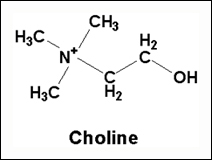Choline – Uses, Benefits, Sources and Dosage

Choline comes in the list of macronutrients which is essential for the normal development of brain, healthy liver functions, nerve functions, healthy metabolism and proper movements of muscles. Choline is available in the form of phosphatidycholine, a compound which helps in the formation of structural component of fat thus it is present in variety of foods which contain the fats. It plays a vital role in the countless processes that occur in the body every day. It also aids in the process of methylation which is used for nerve signaling, to create DNA and for detoxification.
Health Benefits of Choline
- Formation of DNA and cell structures – It helps in the fat absorption by body which is further required to create cell membrane and structures. It also helps to create DNA. It helps in the methyl group processes which are responsible for the formation of genetic material.
- Supports Central Nervous System – It plays an important role in the growth and brain development. It also improves the structural integrity and signaling capability of nerves.
- Healthy Liver Function – Choline also helps in the transportation of fats from liver cells to throughout body. Thus it helps to maintain the liver safe from fat building.
- Brain functioning – It is essential to prevent brain from dementia, memory loss and cognitive declines. It also helps to maintain the brain elasticity.
- Good heart health – It helps in the conversion of homocyeteine which helps to prevent the too much fat accumulation in the body. Thus it reduces the risk of heart attack or stroke.
- It helps to improve the body’s stamina and maintains the good energy levels in body.
Food Sources of Choline
- Salmon
- Chickpeas
- Split Peas
- Navy Beans
- Eggs
- Grass-Fed Beef
- Turkey
- Chicken Breast
- Cauliflower
- Carrot
- Tomatoes
- Peppers
- Goat Milk
- Brussel Sprouts
Choline Deficiency
People with choline deficiency are at the risk of fatty liver disease (FLD). It is the reversible condition in which triglyceride fats get accumulated in liver cells.
Decreased amount of choline are associated with the cognitive decline, Alzheimer’s disease and memory loss.
Symptoms which are associated with choline deficiency are listed below:-
- Low energy levels
- Fatigue
- Muscle aches
- Memory loss
- Cognitive decline
- Learning disabilities
- Nerve damage
- Behavioral changes
Side Effects of High intake of Choline
Over consumption of choline may lead to excessive sweating, increased body temperature as well as increased salivation. Nausea, stomach upset, diarrhea and loss of appetite are also the complications associated with high intake of choline.
Daily intake Recommendations of Choline
- Infants and babies require: 125- 150 mg
- Children at the age 1-8: 150- 250 mg
- Teens age 8-13: 250- 375 mg
- Women above age of 14: 425- 550 mg
- Men above age of 14: 550 mg
- Pregnant women require : 450-550 mg
- Breastfeeding women require: 550 mg



